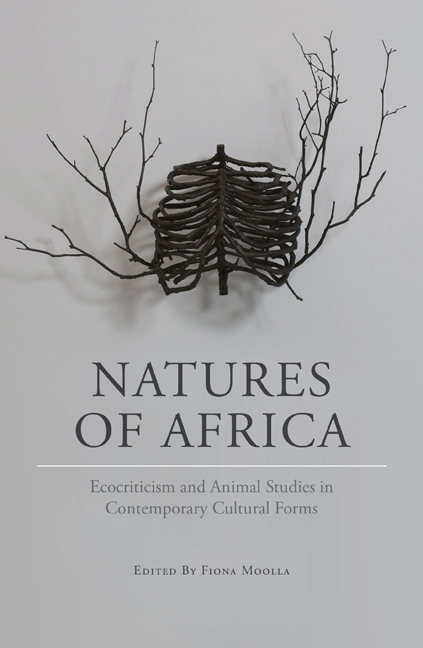Book contents
- Frontmatter
- Table of Contents
- Foreword
- Introduction
- 1 ‘Here is Some Baobab Leaf!’: Sunjata, Foodways and Biopiracy
- 2 Shona as a Land-Based Nature-Culture: A Study of the (Re)Construction of Shona Land Mythology in Popular Songs
- 3 The Environment as Significant Other: The Green Nature of Shona Indigenous Religion
- 4 Animal Oral Praise Poetry and the Samburu Desire to Survive
- 5 The Paradoxes of Voluntourism: Strategic Visual Tropes of the Natural on South African Voluntourism Websites
- 6 Towards an Ecocriticism in Africa: Literary Aesthetics in African Environmental Literature
- 7 Critical Intersections: Ecocriticism, Globalised Cities and African Narrative, with a Focus on K. Sello Duiker's Thirteen Cents
- 8 Navigating Gariep Country: Writing Nature-Culture in Borderline by William Dicey
- 9 Negotiating Identity in a Vanishing Geography: Home, Environment and Displacement in Helon Habila's Oil on Water
- 10 Human Masks? Animal Narrators in Patrice Nganang's Dog Days: An Animal Chronicle and Alain Mabanckou's Memoirs of a Porcupine
- 11 Nature, Animism and Humanity in Anglophone Nigerian Poetry
- 12 Animals, Nostalgia and Zimbabwe's Rural Landscape in the Poetry of Chenjerai Hove and Musaemura Zimunya
- About the authors
- Acknowledgements
- Notes
- Index
9 - Negotiating Identity in a Vanishing Geography: Home, Environment and Displacement in Helon Habila's Oil on Water
Published online by Cambridge University Press: 10 May 2018
- Frontmatter
- Table of Contents
- Foreword
- Introduction
- 1 ‘Here is Some Baobab Leaf!’: Sunjata, Foodways and Biopiracy
- 2 Shona as a Land-Based Nature-Culture: A Study of the (Re)Construction of Shona Land Mythology in Popular Songs
- 3 The Environment as Significant Other: The Green Nature of Shona Indigenous Religion
- 4 Animal Oral Praise Poetry and the Samburu Desire to Survive
- 5 The Paradoxes of Voluntourism: Strategic Visual Tropes of the Natural on South African Voluntourism Websites
- 6 Towards an Ecocriticism in Africa: Literary Aesthetics in African Environmental Literature
- 7 Critical Intersections: Ecocriticism, Globalised Cities and African Narrative, with a Focus on K. Sello Duiker's Thirteen Cents
- 8 Navigating Gariep Country: Writing Nature-Culture in Borderline by William Dicey
- 9 Negotiating Identity in a Vanishing Geography: Home, Environment and Displacement in Helon Habila's Oil on Water
- 10 Human Masks? Animal Narrators in Patrice Nganang's Dog Days: An Animal Chronicle and Alain Mabanckou's Memoirs of a Porcupine
- 11 Nature, Animism and Humanity in Anglophone Nigerian Poetry
- 12 Animals, Nostalgia and Zimbabwe's Rural Landscape in the Poetry of Chenjerai Hove and Musaemura Zimunya
- About the authors
- Acknowledgements
- Notes
- Index
Summary
The world into which I was born has changed drastically over the years. It has gone without being replenished … But the major problem had to do with the discovery of oil in the Delta. The oil boom became doom for inhabitants of the region. (Ojaide 1996: 122)
Crimes against humanity require new means of redress, a mechanism that records hidden histories of atrocity, didactically promotes collective memory, and gives victims a place of respect, dignity, and agency in the process. (Cole 2007: 171)
The writer of fiction can be and must be the pathfinder. (Ngu∼gı∼ wa Thiong'o 1986: 85)
What is left of Nigeria's Niger Delta today is its residual ecological image. Bearing in mind the total significance of what the habitat once represented for the inhabitants of this capriciously vanishing wetland, the need to salvage what is left is absolutely imperative. The aftermath of the mindless and soulless exploration and exploitation of crude oil in the area has led to the destruction of the major part of ecolife in the Niger Delta. Life has become precarious for the human inhabitants and other living beings that make up the ecosystem of this wetland as a result of the nightmarish consequences of oil exploitation, captured in the apocalyptic images of river oil slicks and hellish flares against the night sky. As a consequence, numerous creek communities, both human and animal, which form part of an interconnected natural web, have evacuated and continue to evacuate this area. Therefore, one often observes flocks of migratory birds circling the skies, struggling to locate their former habitat, then in frustration changing direction to alternative feeding sites. Animals are either burnt to death by uncontrolled gas flares or die of starvation. The most stunning of the ecological disasters in the area are the dead rivers, a product of constant blow-outs and oil spillages. It is important to note that the activities of multinational oil firms in the Niger Delta have completely destroyed local biodiversity and devastated local economies. Migratory birds are now seldom seen in this area. Many freshwater plant species have become extinct, and fishing – once a primary source of income for local people – has come to a tragic end. With the transformations to the creeks and wetlands, the climate also continues to change with the passage of time.
- Type
- Chapter
- Information
- Natures of AfricaEcocriticism and Animal Studies in Contemporary Cultural Forms, pp. 212 - 234Publisher: Wits University PressPrint publication year: 2016

